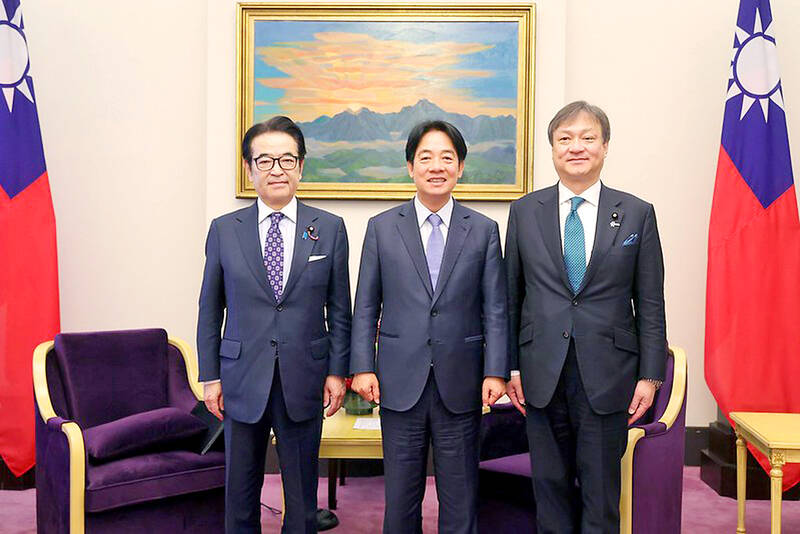Tokyo’s support for Taiwan Semiconductor Manufacturing Co’s (TSMC, 台積電) wafer fabs in Kumamoto Prefecture bears “tremendous significance” on future industrial partnerships between the two countries, Vice President and president-elect William Lai (賴清德) said yesterday.
Lai made the remarks during a meeting with Tsuneo Kitamura and Iwao Horii, two lawmakers in Japan’s House of Councilors, at the Presidential Office in Taipei.
With TSMC’s first fab scheduled to open on Saturday, Lai thanked the Japanese government and parliament for their support, which allowed the fab to be completed in one year and eight months.

Photo courtesy of the Presidential Office
Taiwan’s largest contract chipmaker earlier this month announced that it is building a second fab in the prefecture, Lai added.
“We believe these projects bear tremendous significance in terms of future industrial partnerships between the two countries and how we can jointly face the challenges and opportunities presented by the ‘smart era,’” he said.
Other Taiwanese semiconductor firms, such as United Microelectronics Corp (UMC, 聯電), Powerchip Semiconductor Manufacturing Corp (力積電) and ASE Technology Holding Co (日月光投控), are also investing in Japan, and should also find great support from Japanese officials and lawmakers, he said.
Kitamura and Horii have been paying attention to peace and stability across the Taiwan Strait, and, with their extensive experience, should contribute greatly to issues relating to defense, national security and diplomacy, he added.
Taiwan will continue to need the support of the two Japanese lawmakers to help maintain peace and stability in the region, he said.
“Taiwan on Jan. 13 accomplished a historic mission, with the people using their vote in the presidential election to decide the direction that the nation is heading. They decided to continue on the path to democracy and the world to make Taiwan stronger,” Lai said.
“I hope that Taiwan and Japan can build on their foundation and bolster ties through various types of partnerships,” he added.
Kitamura told Lai that former Japanese prime minister Shinzo Abe had promoted an Indo-Pacific strategy that values freedom and liberal democracy.
Taiwan and Japan need to work more closely together on security, economics, trade, tourism exchange and social welfare issues, with economic and trade relations between the two countries being the most important, Kitamura said.
“We hope that Vice President Lai, as an old friend of Japan, will continue to promote exchanges among the two nations’ lawmakers once you are sworn in as president. Under your leadership, the exchanges and partnerships between Japan and Taiwan will continue to develop and move forward through the work of the Taiwan-Japan Relations Association and the Japan-Taiwan Exchange Association,” Kitamura said.
Aside from thanking President Tsai Ing-wen (蔡英文) and Lai for conveying their condolences on the death of Abe’s mother, Kitamura also thanked them for expressing their sympathies to people affected by a series of earthquakes on the Noto Peninsula, as well as for the generous donations from Taiwanese.
The donations during such a difficult time again showed that Taiwan and Japan are true friends, he added.

CHAOS: Iranians took to the streets playing celebratory music after reports of Khamenei’s death on Saturday, while mourners also gathered in Tehran yesterday Iranian Supreme Leader Ayatollah Ali Khamenei was killed in a major attack on Iran launched by Israel and the US, throwing the future of the Islamic republic into doubt and raising the risk of regional instability. Iranian state television and the state-run IRNA news agency announced the 86-year-old’s death early yesterday. US President Donald Trump said it gave Iranians their “greatest chance” to “take back” their country. The announcements came after a joint US and Israeli aerial bombardment that targeted Iranian military and governmental sites. Trump said the “heavy and pinpoint bombing” would continue through the week or as long

TRUST: The KMT said it respected the US’ timing and considerations, and hoped it would continue to honor its commitments to helping Taiwan bolster its defenses and deterrence US President Donald Trump is delaying a multibillion-dollar arms sale to Taiwan to ensure his visit to Beijing is successful, a New York Times report said. The weapons sales package has stalled in the US Department of State, the report said, citing US officials it did not identify. The White House has told agencies not to push forward ahead of Trump’s meeting with Chinese President Xi Jinping (習近平), it said. The two last month held a phone call to discuss trade and geopolitical flashpoints ahead of the summit. Xi raised the Taiwan issue and urged the US to handle arms sales to

State-run CPC Corp, Taiwan (CPC, 台灣中油) yesterday said that it had confirmed on Saturday night with its liquefied natural gas (LNG) and crude oil suppliers that shipments are proceeding as scheduled and that domestic supplies remain unaffected. The CPC yesterday announced the gasoline and diesel prices will rise by NT$0.2 and NT$0.4 per liter, respectively, starting Monday, citing Middle East tensions and blizzards in the eastern United States. CPC also iterated it has been reducing the proportion of crude oil imports from the Middle East and diversifying its supply sources in the past few years in response to geopolitical risks, expanding

Pro-democracy media tycoon Jimmy Lai’s (黎智英) fraud conviction and prison sentence were yesterday overturned by a Hong Kong court, in a surprise legal decision that comes soon after Lai was jailed for 20 years on a separate national security charge. Judges Jeremy Poon (潘兆初), Anthea Pang (彭寶琴) and Derek Pang (彭偉昌) said in the judgement that they allowed the appeal from Lai, and another defendant in the case, to proceed, as a lower court judge had “erred.” “The Court of Appeal gave them leave to appeal against their conviction, allowed their appeals, quashed the convictions and set aside the sentences,” the judges